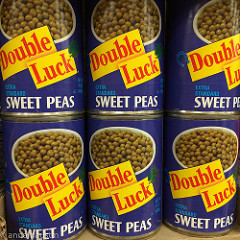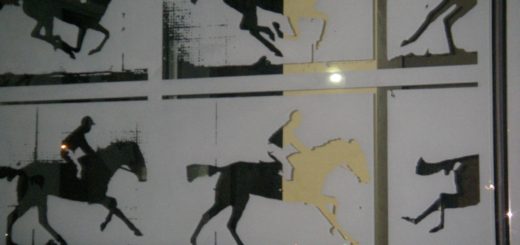History in the Soup Aisle
by Jason T. Sparks, Our Man in Nashville
Nashville, Tennessee, March 26, 2020

Staff Sgt Edgar T Sparks, Jr, my grandfather, late of the US Army Air Corps and the China-Burma-India theatre of combat during WWII, died on a grey Friday in January of 1998. He died in Nashville’s VA hospital, after a bout of lung cancer that cost him a lung (despite which, he woke up post-op and asked for one of his Garcia Y Vega cigars).
My Grandpa’s passing was the zero hour for a new chapter in my life and in my family’s life, and at the time, I had no idea that it was. It tore up my Dad; like a lot of Boomers with Greatest Generation dads, a lot had been left unsaid, and it hurt him—he had claimed to be sober since 1988, but that night, he openly drank in front of me. Like a lot of Gen-Xer ACOAs with Boomer dads, I had no idea how to respond, and let it slide.
My wife, during all this, was in and out of the hospital; she was scheduled to have bariatric surgery, which in 1998 was still a high-risk, insanely complex procedure—and it was scheduled for the day that wound up being the day of my Grandpa’s funeral. I drove my wife to the hospital at 4:00 in the morning, buried Grandpa at 11:00. By 5:00, I was back at the hospital, in ICU, watching a variety of devices keep my wife alive, as they would for the next four days. Later that night, for reasons I have yet to fully comprehend, I mitigated my grief and fear by going to a strip club. It seemed like a reasonable idea at the time.
All of which to say, this was a time in my life when I had a lot on my mind. One Sunday, not long after the funeral, my wife had been re-admitted to the hospital, and I met my Dad for lunch at the hospital cafeteria. Over greasy cheeseburgers (the staff at hospital canteens know that their customers are likely as not eating their feelings), I shared a thought with my Dad, to wit: I was jealous of my grandfather. Not because he had died, but because, while he was alive, he “got to” fight in World War II. World War II! Everybody’s favorite war! The good guys were clearly good guys, the bad guys have probably never been clearer-cut bad guys, everyone from the leaders to the foot soldiers was a character—even the cars and music were cool! Why, I lamented, could I not have my World War II? I suppose I agreed with Kurt Vonnegut—“What are World Wars for, if not to change people?”—and I yearned for something big and game-changing in my own life.
My dad then dispensed one of those pieces of wisdom that, in the moment of its dispensation, makes little sense, but you know on some level that it ultimately will. “Well, Hoss,” he said as he leaned back in his chair, “don’t…don’t worry about finding history. History will find you.”
It’s been 22 years since he said it, and I suspect that, via COVID-19, history has found me. Then again, history has found everyone, hasn’t it? If you’re reading this, you either have it, or know someone who does, or are particularly concerned about someone who might get it, or have seen at least one part of your life impacted by it. For that matter, if you aren’t reading this, at least one of those conditions applies to you as well.
For me, for now, it’s the latter two. My wife has the immune system of a shrimp quesadilla, thanks to Systemic Lupus; as such, she’s at extremely high risk. My son has a decent immune system, but it isn’t perfect, thanks to pre-birth drug exposure by the birth mama, and he spent most of January and February dealing with pneumonia. My son is normally at a college for people with Intellectual Disabilities in rural Wisconsin; he had to come home for spring break about two weeks early—and won’t be back on campus until May, if then—because a confirmed case was found in Racine, which is near his school. (That, and the governor of Wisconsin closed all the schools in the state until late April.) Thus, I found myself picking him up from the Greyhound station at 2:30 in the morning; the normally raucous station was extremely quiet, and many faces were obscured by surgical masks, their odd flashes of sterile color like blood on the doorpost, so these post-modern Israelites would be passed over. To get to the bus station, I drove past two cemeteries, an answering service, and a dairy. My father-in-law is in one of the cemeteries. I once worked at the answering service, and took calls from police, at nursing homes, trying to reach the doctor on record so he could certify a resident’s death. The dairy, my dad sold advertising to. He’s dead. The actor who became famous in the commercials is dead. The agency no longer exists, and their Italianate brownstone office building burnt to the ground. My simple errand to collect my son took me through a tour of death, an errand I was running to hopefully avoid death.
This past Sunday, the mayor of Nashville issued a “Safer At Home” order, whereby any Nashvillians with non-essential jobs are required to stay home. It’s similar to edicts now in effect in New York, California, and Illinois, but it’s dissimilar as well, in that it means virtually nothing. Florists and liquor stores are essential, for example, as are car dealerships, dry cleaners, and vape shops—that’s right, the continued availability of e-cigs is one of the things standing between dystopia and us. There are plentiful loopholes through which a business can declare itself essential, and remain open—and my employer is one of those businesses. I suppose deeming us essential isn’t a complete and utter strain on credibility, since we are tangential to the financial industry (e.g., we walk users of tax prep software through problems, from the complex to the routine, largely using our reassuring voices, and working in tandem with their computers). I have, to be honest, mixed emotions about still being at work. As an Aspie, I crave routine, and even though my job is…well, my job, the thought of not going through that set of daily rituals terrifies me. On the other hand, leaving home every day, thus possibly being exposed, thus possibly exposing my wife and son when I get home, terrifies me as well. On the third hand, our house needs a lot of work, work that I would love to throw myself into completely, but this is the tax season, and so I am (and have been for months) working 53 hours a week (and sometimes more). Even before news of this pandemic, I was feeling burnout and wishing I could just stay home and fix things there, rather than for a living. Apparently, I made that wish in the presence of Rod Serling. (Not that Rod is even delivering in this case; srsly, Serling, get it together, man!)
That said, our management have suddenly decided to train us on handling customer inquiries via chat and email; also, I was asked if I have a smart phone and internet access chez moi. And I asked my manager if it meant anything. My manager, to coin a phrase, keeps his cards close to his chest; I’ve worked alongside him five years now, and have learned the following about him:
His name is *Jeff. (*not his real name)
He prefers DC Comics to Marvel.
But even he said that yes, part of this new learning is to prepare for us possibly working from home, if that should arise, if our Governor, his Republican orientation notwithstanding, should decide to see and raise our mayor’s bid.
The suspense is killing me.
I think that, years from now, if all or most of us are still here, we’ll talk about this.
A question some as-yet-unborn reporter may ask is when did it become real for you? For me, that happened on the same day I picked my son up from the bus station when, hours earlier, I engaged in a very American activity that most of us do even as we loathe doing it: I went shopping at Mr. Walton’s inevitable Mart. Whether you want to cop to this or no, you know the model there: it’s a store where everything in the farkarkte world is available all day every day forever. If you find yourself needing yarn, luggage, and 18 cans of cling peaches at 4:00 AM, they got this.
Normally.
Today, the 50-foot-long frozen food aisle was empty.
As was the dairy case.
Ditto the soft drink aisle, the beer aisle, and, of course, the entire wall devoted to toilet paper.
The Canned Goods remained, but were dwindling; I found myself in front of a shelf of off-brand chicken noodle soup.
I am an intelligent man. My IQ is 117. I have two Master’s Degrees.
Suddenly seized by the fear that I might never be able to shop again, I bought 24 cans of soup.
History had found me.





















